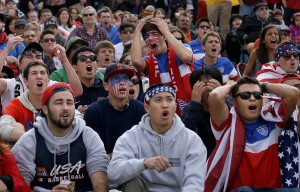NEW YORK — Finally some good global news! The World Cup in Brazil continues to captivate international audiences with a mix of amazing soccer and increasingly surprising results.
Paradoxically, early in the tournament the powerhouse teams were nearly all knocked out of the running; Spain, Italy, England and Portugal. Others like the USA, Costa Rica, France and Uruguay surged forward. So the field is open for some serious upsets as the sporting extravaganza passes its midpoint.
Football, or soccer as we call it here in the USA, represents not only the proverbial beautiful game but also a clear-cut manifestation of national pride and sporting prowess. It’s about excellence to be one of the 32 teams at the World Cup as well as nationalistic team pride to keep the momentum going on the pitch.

When the Netherlands plays, there’s a sea of orange spectators. In their first stunning win (5-1) over arch-rival Spain, the Dutch King and Queen were in attendance. When the Wilhelmus Anthem is played, there’s a power surge of orange positive patriotism.
And look at the ecstatic Team USA fans, with the banner One Nation/One Team, a positive reflection of a country in such a deep political funk.
Listen to the national anthems. While we are all familiar with France’s stirring Marseillaise or the USA’s Star Spangled Banner, the South American anthems seem based on Neapolitan arias. Many players sing along with pride, others stand mum.
Brazil the host, has been widely criticized for sloppy preparation but happily the games are going smoothly and safely. Actually Brazil hosted the World Cup back in 1950, the first FIFA football event since WWII. In that tournament Uruguay won.
Indeed, the World cup has been an extraordinary proving ground for both football and national standing. Hosting the World Cup while costly, allows for a corresponding flow of economic development, tourism, and prestige. As with the Olympics, countries vie to host the World Cup to be placed on the pedestal of national pride.
South Africa’s successful hosting of the 2010 World Cup saw a surge of recognition, goodwill and standing.
It’s also about national prestige. World Cups create sports winners and political breakthroughs. The 1954 World Cup was won by Germany; this was an extraordinary breakthrough for the defeated country in the postwar era. The tournament win importantly and psychologically signaled Germany’s re-acceptance and return to the family of nations. Germany last won the World Cup in 1990 on the eve of its reunification.
The teams playing in Brazil are ironically reflections of globalization. Many of the players don’t play in their home countries but on powerhouse high-paying foreign teams. Portugal’s Ronaldo plays with Real Madrid. Holland’s Arjen Robben plays in Germany’s Bayern Munich, and Robin van Persie is on Manchester United.
France’s amazing Karim Benzema is with Real Madrid. Germany’s Miroslav Klose plays for Italy’s Lazio. USA’s Fabian Johnson plays for Germany’s Bourissia.
Again this is not exactly novel. Ferenc Puskas, one the greatest footballers of all time, fled from his Hungarian homeland under the communists, and then played for Real Madrid.
Coaches too reflect this globalization. Jurgen Klinsmann, the German football superstar from the winning 1990 team, is the manager of Team USA. Japan’s manager Alberto Zaccheroni, is an Italian.
Fast and furious matches define much of the action. The pressure only increases now that we are down to sixteen teams. Though the USA saw a heartbreaker loss to Germany 1-0 in the rain of Recife, both U.S. and Germany move forward to the final sixteen.
Now the fun begins with USA, Germany, France, Argentina and Uruguay in playoffs. Some wags say the contest will ultimately come down to Europe versus South America.
My short list of finalists; Netherlands, Argentina, Germany.
The tempo of the matches and the ebb and flow of play reflects the momentum of a high stakes geopolitical chess game and the shifts back and fourth on the green playing pitch. So let the exhilarating showdowns begin.
John J. Metzler is a U.N. correspondent covering diplomatic and defense issues. He writes weekly for WorldTribune.com. He is the author of Transatlantic Divide ; USA/Euroland Rift (University Press, 2010).


You must be logged in to post a comment Login